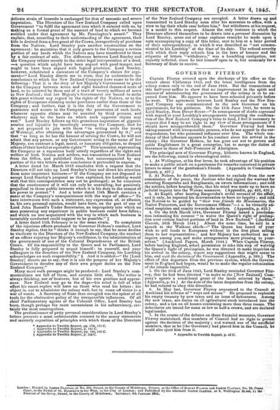GOVERNOR FITZROY.
Captain Fitzroy entered upon the discharge of his office as Go4 vernor about Christmas 1843, and the latest intelligence from the colony comes only to the end of June 1844. But the transactions of this half-year suffice to show that no improvement in the spirit and manner of administering the government of the colony is to be expected from him. He appears to have been schooled privately before he went. The agreement between Lord Stanley and the New Zealand Company was communicated to the new Governor on his appointment, for his guidance. On the 15th June 1843, he wrote to Lord Stanley, from Dover Street—" In consequence of doubts expressed with regard to your Lordship's arrangements respecting the confirmation of the New Zealand Company's titles to land, I feel it necessary to request that I may be set right in my view of those arrangements if I should have misapprehended them." Governor Fitzroy had been taking counsel with irresponsible persons, who do not appear in the correspondence, but who possessed influence over him. The whole tendency of that influence appears in his conduct since his arrival in the colony : like Governor Hobson, he has gone out not to govern and guide Englishmen in a great enterprise, but to merge the dines of
Governor in those of Sub-Protector of Aborigines. '
The principal acts of Governor Fitzroy, hitherto known in England, are the following, stated in chronological order.
1. At Wellington, at his first levee, he took advantage of his position to make a public attack on a gentleman for remarks contained in private letters to some of the gentleman's friends. (Appendil to Committee's Report, p. 497.)
2. At Nelson, he declared his intention to exclude from the new commission of the peace, the Justices who had signed the warrant for arresting Rauperaha and Rangihaeata' on sworn informations; and told the settlers, before hearing them, that his mind was made up to have no judicial inquiry into the Wairau massacre. (Appendix, pp. 423, 425.)
3. At Kapiti, after hearing Rauperaba's artful account of the affair, and it only, he repeated his determination to have no inquiry; and told the Natives to be guided by "their true friends the Missionaries, the Native Protectors, and the Government Officer."—i. e, he virtually advised suspicion and enmity towards the settlers. (Appendix, p. 423.)
4. On the 26th March 1844, Governor Fitzroy issued a proclamation intimating his consent "to waive the Queen's right of preemption over certain limited portions of land in New Zealand." (Auckland Gazette, 26th March 1844.) About the same time, he said in a speech to the Waikato' chiefs—" The Queen has heard of your wish to sell lands to Europeans without in the first place selling them to her representative ; and her Majesty has authorized me to inquire among you, and make arrangements more pleasing to yourselves." (Auckland Papers, March 1844.) When Captain Fitzroy, before leaving England, asked permission to take this step of waiving the Queen's right of preemption, he was directed td make inquiries on his arrival in the colony, report any suggestions that might occur to him, and wait the decision of the Government. (Appendix, p. 389.) The effect of this departure from the previous system, which the Government in England had begun, would be to make the regular colonization of the islands impossible.
5. On the 26th of June 1843, Lord Stanley reminded Governor Fitzroy, that he had been directed "to make to the [New Zealand] Company's agents a conditional grant of the lands selected by them." (Appendix, p. 94.) At the date of the latest despatches from the colony, he had refused to obey this direction.
6. In May last, Governor Fitzroy announced to the Council at Auckland his scheme of" ways and means." He proposed to replenish his empty treasury by new taxes and an issue of debentures. Among the new taxes, are duties on all agricultural stock introduced into the colony, and a tax on all houses containing more than three rooms. The debentures are issued for sums as low as half-a-crown, and are declared legal tender.
7. In the course of the debates on these financial measures, Governor Fitzroy maintained, that members of Council had no right to protest against the decision of the majority ; and warned one of the unofficial members, that as he (the Governor) had placed him in the Council, he could also eject him from it.
• Appendix to Twelfth Report, p.42 C.






















































 Previous page
Previous page